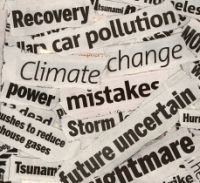

UN climate talks have closed in Durban, South Africa, with an agreement that could have "saved tomorrow, today."
The European Union will place its current emission-cutting pledges inside the legally-binding Kyoto Protocol, a key demand of developing countries. Talks on a new legal deal covering all countries will begin next year and end by 2015, coming into effect by 2020. The management of a fund for climate aid to poor countries has also been agreed, but not how the money will be raised.
Talks ran almost 36 hours past their scheduled close, with many delegates saying the host Government lacked urgency and strategy. However, there was applause when South Africa's International Relations Minister, Maite Nkoana-Mashabane, brought the proceedings to a close. She commented, "We came here with plan A, and we have concluded this meeting with plan A to save one planet for the future of our children and our grandchildren to come. We have made history."
The conclusion was delayed by a dispute between the EU and India over the wording of the "roadmap" for a new global deal. India did not want it to be legally binding. Eventually an agreement was reached. The roadmap proposal originated with the EU, the Alliance of Small Island States (Aosis) and the Least Developed Countries bloc (LDCs). They argued that only a new legal agreement covering emissions from all countries - particularly fast-growing major emitters such as China - could keep the rise in global average temperatures since pre-industrial times below 2°C, the internationally-agreed threshold.
A management framework was also adopted for the Green Climate Fund, which will eventually gather and disburse around £64bn per year to help poor countries develop cleanly and adapt to climate impacts. There has also been significant progress on reducing emissions from deforestation and forest degradation (REDD).
Environment groups were divided in their reaction, with some believing it to be a significant step forward and others claiming it had done nothing to change the course of climate change. Michael Jacobs, visiting professor at the Grantham Research Institute on Climate Change and the Environment in London, said the agreement could bring real changes. "The agreement here has not in itself taken us off the 4°C path we are on. But by forcing countries for the first time to admit that their current policies are inadequate and must be strengthened by 2015, it has snatched 2°C from the jaws of impossibility. At the same time it has re-established the principle that climate change should be tackled through international law, not national, voluntarism."